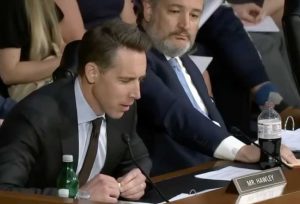Senator Josh Hawley advocates for banning stock trading by members of Congress, asserting it will rebuild public trust, addressing concerns about conflicts of interest and government corruption; yet, critics question motivation and implementation feasibility.
Senator Josh Hawley Champions Ban on Congressional Stock Trading

Senator Josh Hawley Champions Ban on Congressional Stock Trading
Hawley's proposals aim to restore trust in government by eliminating conflicts of interest among lawmakers, but face criticism and logistical challenges.
Senator Josh Hawley’s push for a ban on stock trading by members of Congress is a response to growing public discontent over perceived ethical compromises within the legislative branch. Highlighting claims of corruption and conflicts of interest among lawmakers, Hawley's proposals are rooted in a populist ideology, appealing to both sides of the political spectrum.
Hawley has been active in promoting several key legislative initiatives designed to enhance ethical standards in Congress:
1. **The Banning Insider Trading in Congress Act (2023)**: This proposed legislation would prohibit members of Congress, along with their spouses and dependent children, from owning or trading individual stocks during their time in office. Punitive measures for violations include loss of profits and penalties equivalent to congressional salaries. Hawley argues that this measure is essential for removing conflicts of interest, ensuring that lawmakers focus on their duties rather than personal financial gains.
2. **Support for the STOCK Act (2012)**: This act mandates timely public disclosures of stock trades by Congress members and forbids insider trading but has seen weak enforcement, with many lawmakers neglecting to meet disclosure requirements. Hawley advocates for more rigorous enforcement of the STOCK Act and suggests closing loopholes that allow lawmakers to escape penalties for tardy disclosures.
Hawley asserts that allowing lawmakers to trade stocks leads to unavoidable conflicts of interest, especially as they often have access to sensitive information that can sway market dynamics. Given the plummeting public trust in Congress, he believes prohibiting stock trading is a concrete step toward rebuilding credibility in government institutions. He frames public service as an obligation, distinct from opportunities for personal wealth creation, and stresses that Congress should adhere to ethical principles on par with those imposed upon ordinary citizens.
Despite his growing popularity, Hawley’s approach has faced scrutiny regarding potential partisan motivations and the practical feasibility of enforcement. Critics suggest that a ban on stock trading may not comprehensively address wider ethical concerns persisting in Congress, such as lobbying and campaign financing, raising questions about the sufficiency of focused reforms.
Public sentiment, however, has largely favored Hawley’s proposals. Numerous polls have shown strong bipartisan support for reforms against congressional stock trading, linking figures from across the aisle — including those with progressive backgrounds, such as Senator Elizabeth Warren — in a collective effort to combat corruption.
The push to reform congressional stock trading is set against a backdrop of historical corruption scandals, which have historically highlighted the need for regulatory reforms. Numerous events, including the notorious Abscam scandal in the 1980s and insider trading instances during the 2008 financial crisis, provide a resonance to Hawley’s current crusade.
Hawley, who gained attention for his legal advocacy during his tenure as Missouri's Attorney General, brings a populist spirit to his congressional career, signaling a desire for accountability and reform within the government. As he navigates the complexities of enacting a ban on stock trading, the potential for substantial impacts on government ethics looms large.
Should Hawley's initiative succeed, it could catalyze comprehensive reforms across other governmental branches and initiate an era of heightened ethical standards. His advocacy signifies a commitment to transparency and aims to restore public trust by reinforcing the notion that lawmakers operate as public servants rather than personal profiteers. The eventual outcome of this movement may reshape not only Congress but also set precedents for overall governance practices in America.




















